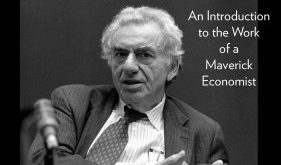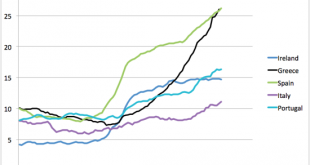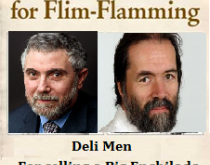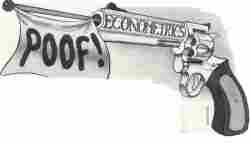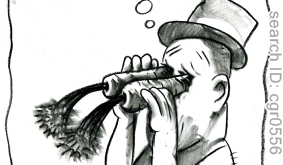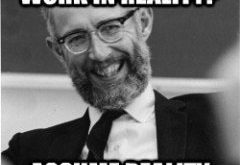In his book Why Minsky Matters L. Randall Wray tries to explain in what way Hyman Minsky’s thoughts offer a radical challenge to mainstream economic theory. Although there were a handful of economists who had warned as early as 2000 about the possibility of a crisis, Minsky’s warnings actually began a half century earlier—with publications in 1957 that set out his vision of financial instability. Over the next forty years, he refined and continually updated the theory. It is...
Read More »Robert Lucas — an example of macroeconomic quackery
Robert Lucas — an example of macroeconomic quackery In an interview a couple of years ago, Robert Lucas said he now believes that “the evidence on postwar recessions … overwhelmingly supports the dominant importance of real shocks.” So, according to Lucas, changes in tastes and technologies should be able to explain, e.g., the main fluctuations in unemployment that we have seen during the last seven decades. Let’s look at the facts and see if there is any...
Read More »Behavioural finance
To-day, in many parts of the world, it is the serious embarrassment of the banks which is the cause of our gravest concern … [The banks] stand between the real borrower and the real lender. They have given their guarantee to the real lender; and this guarantee is only good if the money value of the asset belonging to the real borrower is worth the money which has been advanced on it. It is for this reason that a decline in money values so severe as that which we are now...
Read More »Simpson’s paradox, Trump voters and the limits of econometrics
Simpson’s paradox, Trump voters and the limits of econometrics [embedded content] From a more theoretical perspective, Simpson’s paradox importantly shows that causality can never be reduced to a question of statistics or probabilities, unless you are — miraculously — able to keep constant all other factors that influence the probability of the outcome studied. To understand causality we always have to relate it to a specific causal structure. Statistical...
Read More »Simon Wren-Lewis — flimflam defender of economic orthodoxy
Simon Wren-Lewis — flimflam defender of economic orthodoxy Again and again, Oxford professor Simon Wren-Lewis rides out to defend orthodox macroeconomic theory against attacks from ‘heterodox’ critics like yours truly. A couple of years ago, it was the rational expectations hypothesis (REH) he wanted to save: It is not a debate about rational expectations in the abstract, but about a choice between different ways of modelling expectations, none of which...
Read More »Keynes’ devastating critique of econometrics
Keynes’ devastating critique of econometrics Mainstream economists often hold the view that Keynes’ criticism of econometrics was the result of a sadly misinformed and misguided person who disliked and did not understand much of it. This is, however, nothing but a gross misapprehension. To be careful and cautious is not the same as to dislike. Keynes did not misunderstand the crucial issues at stake in the development of econometrics. Quite the contrary. He...
Read More »RBC models –the art of missing the point completely
RBC models –the art of missing the point completely The real business cycle program is part of the larger new classical macroeconomic research program. Proponents of these models often promote them as models that provide satisfactory microfoundations for macroeconomics … The claim for providing microfoundations is largely based on the fact that new classical models in general, and real business cycle models in particular, model the representative agent as...
Read More »Robert Lucas and the triumph of empty formalism
Robert Lucas and the triumph of empty formalism Vielleicht ist diese Grundperspektive der radikalen Trennung von Form und Gehalt hilfreich, einige zunächst überaus paradoxe Äußerungen von Lucas etwas zu erhellen. Erinnert man sich der Forderungen von Lucas, die Makroökonomik zwingend auf Basis der klassischen Postulate, die Lucas und Sargent (1978) als (a) „Markträumung“ und (b) „Eigennutz“ umrissen hatten, zu errichten, so erstaunt man doch angesichts...
Read More »Solow kicking Lucas and Sargent in the pants
Solow kicking Lucas and Sargent in the pants In opening the conference, Frank Morris mentioned his disappointment or disillusionment – which many others share – that the analytical success of the 1960s didn’t survive that decade. I think we all knew, even back in the 1960s, that as Geof put it, “inflation doesn’t wait for full employment.” These days inflation doesn’t even seem to care if full employment is going along on the trip … The question is: what...
Read More »When your day is night alone (personal)
When your day is night alone (personal) [embedded content] To David and Tora with love Advertisements
Read More » Lars P. Syll
Lars P. Syll

